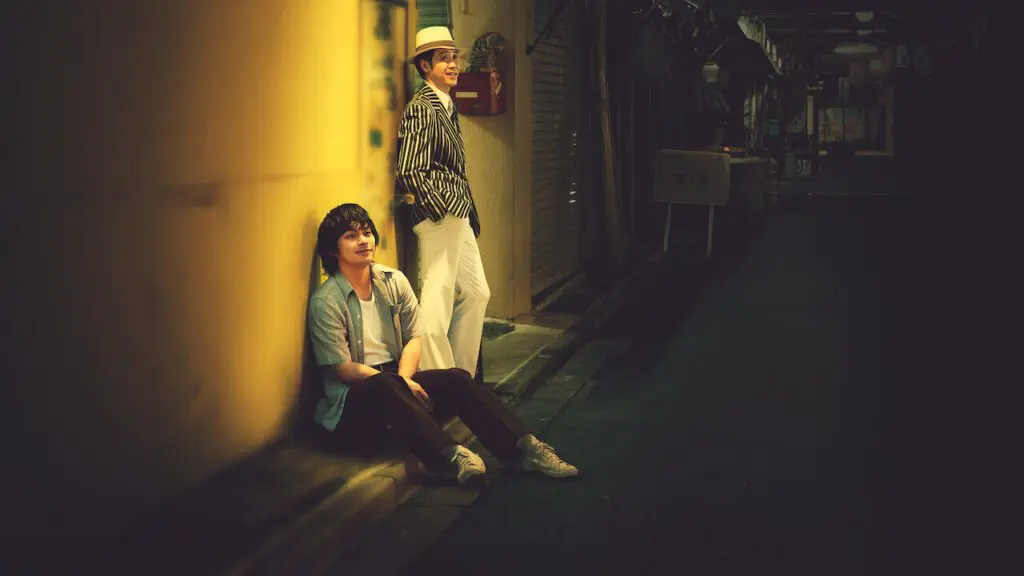Summary
Asakusa Kid is an affectionate and grounded Japanese drama that tells the story of Takeshi Kitano’s journey as an aspiring comedian who starts his career at a strip club and how his encounter with his lifetime mentor changes him.
This review of the Netflix film Asakusa Kid does not contain spoilers.
Ever heard the phrase, “There’s a pain in waves of laughter,”? Or how the funniest person strangely becomes the one who hides the deepest emotions? We often see how comedians throw their jokes and lighten the whole studio, but not how they truly interact behind all the skits. Nowadays, young people are invested in making memes, funny content, and stand-up comedy shows to the extent that stand-up comedians are included as a part of a movement, a brand, or causes because their remarks leave a strong impression especially on critics. Why? And have you ever wondered why comedians mostly joke about the dark sides of life? Well, let Asakusa Kid gives you a glimpse of understanding!
Asakusa Kid is a 2021 Japanese drama written and directed by Gekiden Hitori. The movie is based on 1988’s memoir of Takeshi Kitano. It’s a 2-hour and 2-minute long movie with an intimate approach to Kitano’s transformative years. The movie stars Yuga Yagira, the youngest winner of the Best Actor award in the history of the Cannes Film Festival for his portrayal of 12-year-old Akira in the highly acclaimed Nobody Knows, and Yo Oizumi. The movie entirely uses Japanese but comes with English subtitles.
To pursue his dream as a comedian, Takeshi Kitano (Yuya Yagira) must break free from his old life not once but twice. The first one is when he drops out of college choosing the vagabond life. The second one is when he embarks himself into fame leaving Kitano to begin his transformative journey by working in a struggling Tokyo strip club. From an elevator kid, then given a chance to perform, becoming a substitution for filter performance, to embarking his way to do manzai that’s never been before into TV station.
Of course, if you’re looking for a deeper examination of Takeshi Kitano’s creative process, then you’ll be left disappointed. Because the movie intends to dive deeper into the human and impact of constructive society surrounding Kitano. Unfortunately, we did not see Yakuza. Ekiden Hitori chooses to not solely focus on Kitano, rather, it explores deeper into his surroundings. Asakusa Kid equally dedicated the movie for Senzaburo Fukami (Yo Oizumi), Kitano’s teacher and mentor that plays a big role in his transformation. One of his dialogues, “Don’t get laughed at. You make them laugh,” not only becomes the words that Kitano lives by but also impactful dialogues that change the perspective of a comedian.
Yuya Yugira gives a grounded performance as Takeshi Kitano, mimicking the facial expressions and gestures, although, Kitano’s creative process is rather shallow as a human, we get to explore more of him. Yo Oizum does not fall behind either, he becomes a holy grail for Yugira’s existence which strengthens the characters and story. The other supporting cast also brings a more humane approach to the movie. Mugi Kadowaki, who plays Chiharu, a strip-dancer who dreams of becoming a singer, gives more charm to the movie.
One of the interesting parts is Asakusa Kid brings up subtle issues especially with then underground constructive society. From women’s body and sexuality issues within the patriarch’s communities, the impact of technology and digital transformation that causes a diversion within the conventional way of how people do and perceive entertainment, also the human relationship within the vulnerabilities communities. I find it intriguing how Hitori chooses to focus more on the journey, more than the creative process and the comedic approach when he is a comedian himself. But as you watch the movie, you probably come to understand how Asakusa Kid intends to convey and show the behind the scenes of an iconic comedian, to see him in a more humanist way.
Asakusa Kid reminds me of Swing Kids (2018) with its mood, time frame, jazzy and tap dance influentials, but with a different approach, and there’s no bloody war included. The cinematography is subtle with a blue and brownish tone, giving off earthy and gloomy tones which represent the struggle and broken dreams of each character. Since the background itself is 70’s to 80’s era, the music is heavily influenced by big band formation and swing jazz with a mixture of tap dances which makes it interesting.
Overall, Asakusa Kid It’s a good reflective movie behind the reality of the exterior we’ve seen in TV or showbiz industries. If you’re a fan of skits and comedy, then this movie is for you. But don’t expect to laugh out loud because we’re about to dive deeper into the real tragic comedy called “life.”
What did you think of the Netflix film Asakusa Kid? Comment below.




